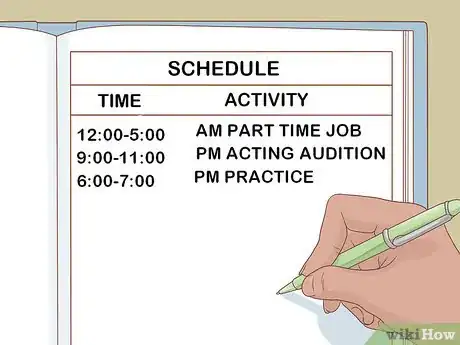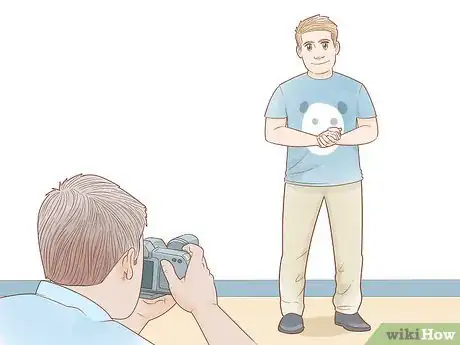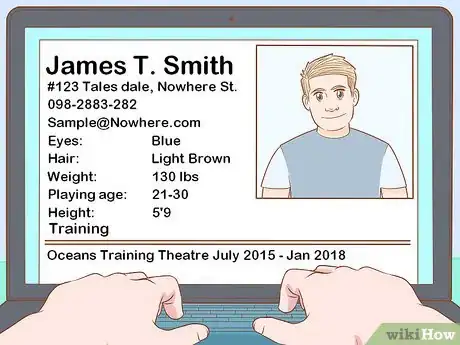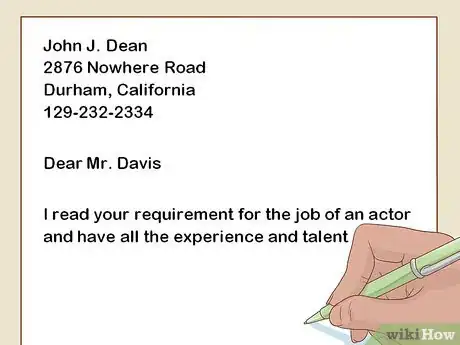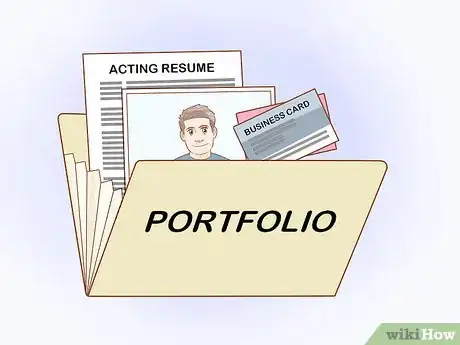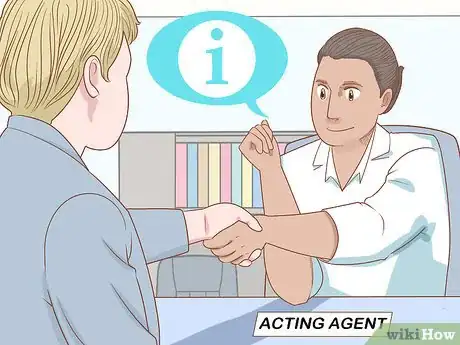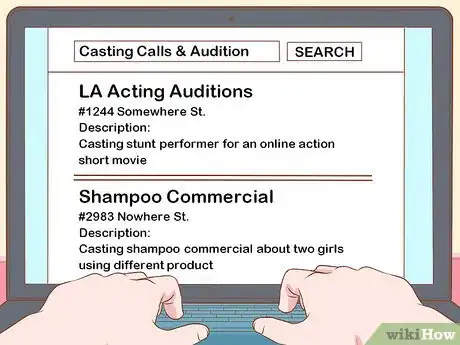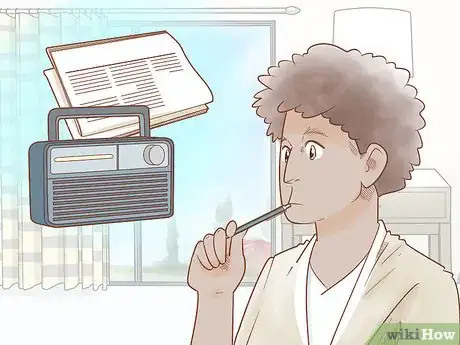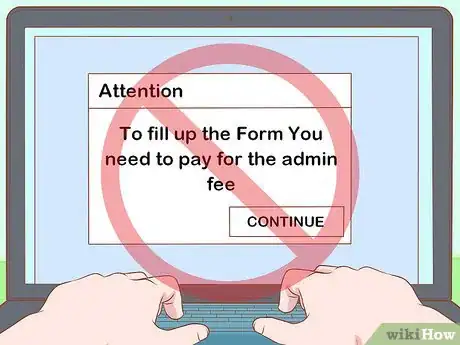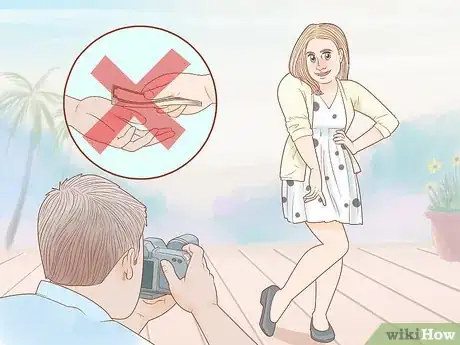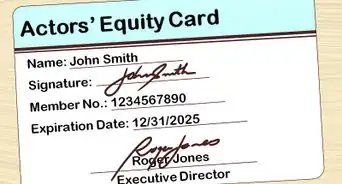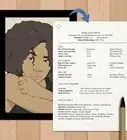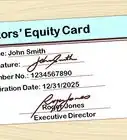This article was co-authored by Lesly Kahn, MFA. Lesly Kahn is an acting teacher and coach based in Los Angeles, California. She is the founder and owner of Lesly Kahn & Company, Actor Training, which focuses on preparing actors for employment in film, television and theatre. With well over 30 years of experience, Ms. Kahn has coached hundreds of actors who have become household names. She also ran the BFA Program in Acting at Marymount Manhattan College, and worked in television as well as New York and regional theatre. Lesly holds a BFA from New York University and an MFA from The Yale School of Drama.
There are 11 references cited in this article, which can be found at the bottom of the page.
wikiHow marks an article as reader-approved once it receives enough positive feedback. This article received 27 testimonials and 90% of readers who voted found it helpful, earning it our reader-approved status.
This article has been viewed 210,177 times.
Have you ever stood in front of a mirror enacting a scene from your favorite movie, or visualized yourself making the acceptance speech with an Oscar in your hand? Don't let your dreams be dreams—an acting career can eventually be yours, even if you're just a beginner. We've put together plenty of tips and tricks to help you get started, so you can put your best foot forward in your new career path.
Things You Should Know
- Study the basics of acting by reading books and watching good performances. To get hands-on experience, sign up for acting classes and workshops in your area.
- Compile professional head shots, an acting resume, a cover letter, and a portfolio before you start looking for jobs.
- Work with an agent, or look for auditions independently. At auditions, do your best to come prepared and make a good impression.
- Keep practicing and honing your craft to advance further in your career. Embrace constructive feedback, and don't be afraid of a little rejection.
Steps
First Steps
-
1Read books on acting. A good way to introduce yourself into the world of acting is by reading books written by actors or acting teachers. You can learn about acting techniques and methods, how auditions are conducted, or what the best ways to get started are.
- Good books to start with might be Sanford Meisner on Acting written by Sanford Meisner and Dennis Longwell, or The Art Of Acting by Stella Adler. These books will help you learn about what to expect as an actor.
-
2Study great performances. While acting classes are a great place for actors to start, you can learn so much from watching classic films. Each film can teach you a different acting skill such as instinct, character development, stage directing, blocking, and physicality. These are just some of the essential tools and skills you will need to learn as an actor, and a great way to begin learning them is by watching professionals practice them. Here are some famous actors showcasing their talent in well-known movies:[1]
- Quvenzhané Wallis in Beasts of the Southern Wild
- Peter Sellers in The Pink Panther
- Johnny Cash in Walk the Line
- Meryl Streep in The Devil Wears Prada
Advertisement -
3Consider your schedule. Acting is very time consuming, and if you seriously want to start your career in acting, you will need to dedicate more time to it than just the weekends. If you currently have a job with demanding hours, you may want to consider getting a job with fewer hours, or a more flexible schedule.[2]
- Many aspiring actors find jobs in the restaurant industry either serving or bartending. It is a great way to earn good money while allowing you the opportunity to switch shifts with another employee if you have a last minute audition, or only work during times that still allow you to go out for auditions.
-
4Be financially prepared. Many aspiring actors are surprised at how time consuming it is to constantly go out on auditions, memorize lines, and develop their acting career. Once you realize how much time you need to dedicate toward acting, you may want to cut back at work, or be tempted to leave your job altogether to focus on acting. Before you make any drastic decisions about your job, make sure you have a hefty savings account to fall back on. You do not want to find yourself looking for acting work, and not able to pay your bills.
- If you truly want to be an actor, pack for your dream. Save up money for at least a year, and make sure that if you're moving to L.A., you have a car that works.[3]
-
5Join acting classes and workshops. With a little searching around online, you can find acting schools near you that offer a wide range of classes. Before joining the first class you come across, do some research about the school and teachers to make sure they can offer you what you are looking for. It is important to take classes that teach you the basics of acting, so that you can develop a strong foundation to build from.[4]
- Look for classes that teach you how to break down a script, create a truthful character, and show you how to have a strong and flexible body and voice.[5]
-
6Talk to other actors. This will allow you to find out what it is really like to go out on auditions, and pursue a career in acting. Speaking with both working actors, and those who have been struggling to find work, may be enlightening, and help to mentally prepare you for what is to come. You may also learn tips and get great advice from people who have already been down the road you are just beginning. Here are some questions you may want to ask:
- "What does a typical day look like for someone who is pursuing acting?"
- "How many times have you been rejected from an audition?"
- "How many auditions do you go on a week?"
- "How much money do I need to get started?"
- "Do you have any advice for someone who is just starting off"?
-
7Decide what type of acting you want to pursue. There are many different types of acting jobs available, and deciding which type you want will narrow your focus and help you find what you are looking for. Here are some different fields of acting to think about:
- Film, TV on prime-time, or soap operas
- Television hosting
- Commercials
- Theatre
Essential Materials
-
1Get head shots taken. Head shots are an essential part of receiving roles because casting directors use them to get a basic idea of who you are so they can decide if they want you to audition. It is highly recommended that you get these pictures professionally taken in order to get a quality picture that is flattering, and shows the casting director you are serious about acting.[6]
- While they are expensive, you only need two great head shots to get started.
- Keep in mind, head shots range from $50-$1000, so be sure to do your research before going just anywhere. You don't want to break the bank, but remember that you want to capture the attention of the casting director with your photos.
-
2Create an acting resume. Your resume needs to be professional and free of any errors. It should include your personal statistics such as your height, weight, eye color, hair color, and body measurements. Include any work you have done, any training your have had or are currently doing, related experiences, talents and skills. Here are some other things to include in your resume:
- Current contact information so the casting or acting agent can contact you.
- List any acting memberships you may belong to.
- Explain the type of role you believe you are best fit for to better inform agents and recruiters about your type. For example, state if you want a leading role, supporting role, voice-over part, or a non-speaking role such as an extra or stunt-double.
- Include whether or not you can speak multiple languages. This may open you up to more acting parts.
-
3Write a cover letter. Your cover letter is your chance to create a personal connection, and add a professional element to the auditioning process. Cover letters should be catered to the specific job you are seeking. Here are some essential pieces to include:
- Start your letter with a greeting, and explain your interest in the specific role.
- State where you went to school, what you are currently working on for your acting career, and what your goals are. This will show your commitment.
- Talk about your best acting accomplishments, or anything you are currently working on. This will show that you have skill and experience.[7]
- Suggest for them to take a look at your head shot and resume to get to know more about what type of actor you are.[8]
-
4Put together a portfolio. This can be in a binder or folder, and should have your head shots, acting resume, cover letter, and possibly a business card inside. This allows you to keep all of your important materials in one organized place. If you have done previous acting work, you should keep it on a DVD, or stored digitally, so you can be ready to show it to a casting director or agent.[9]
Finding Acting Jobs
-
1Find an acting agent. Acting agents utilize their contacts and inside information to help find you jobs. Agents want to find you work, it is how they make money. They will work to set up meetings with casting directors and get you auditions. Agents use your personal information and skills to send you out for jobs that suit you best. They also receive information you do not have access to such as why you may not have gotten a part you went out for. It may be hard to hear negative feedback, but it may also help you grow as an actor.
- Try to find a franchised SAG agent. These agents often have more connections, and they can offer you more legitimate representation.[10]
- To find an agent, research agents online, and mark down the people you are interested in working with. You can read reviews about them, or look them up on the Better Business Bureau to see if they have had claims filed against them.[11]
- Once you find an agent you want to work with, set up a meeting, or send over your portfolio. Hopefully the agent you desire is interested in working with you.[12]
- Never pay an agent before you get a job.
-
2Find auditions on your own. If you do not have an agent, or you just want to see what is out there, city websites can be an excellent resource for checking out local auditions and casting calls. Many films will post current projects and auditions that you can look into for free.[13]
- Watch out for audition websites that require you to pay money to set up an account to find auditions. This might be a scam.
-
3Prepare for an audition. One of the most important things you need to do for an audition is to memorize the script. This signals to the casting director that you take the job seriously, and that you are a professional. Besides just knowing the lines, make sure you understand the character. You should practice auditioning at home in front of the mirror, or other people, so you can get a good feel for the part, and gain confidence. You should practice the part enough so that it feels natural and believable.
- If you're choosing monologues for auditions, choose at least two tonally contrasting ones that are infrequently performed and aren't from iconic films.[14]
-
4Have good manners. If you come across as disrespectful, it may not matter how great of a performance you gave for you audition, you might ruin your chances of getting the job. Here are some helpful tips to keep in mind at your audition:
- Do not touch any of the equipment or food at the audition. You are there as a guest, and you should be respectful of everything and everyone around you.
- Check your personal habits at the door. You should never smoke or chew gum during an audition, unless it is part of the role.
- After your audition, be sure to thank the casting director, and anyone else who helped make your audition possible.
-
5Consider moving to a location with more acting opportunities. Acting auditions are not available just anywhere, and if you want to increase your opportunity to launch and build an acting career, you may want to move to a city that can offer you more chances to audition, and build acting connections with other people in the industry.
- While L.A. and Hollywood have a great reputation for actors to get started in their career, there are other places across the United States that have gained popularity among production companies such as New York, Chicago, New Mexico, Oregon, and Louisiana.[15]
Avoiding Scams
-
1Do your due diligence. Before jumping into anything, make sure it is legit. If something sounds too good to be true, it most likely is. There are a lot of people out there who try to make money by taking advantage of aspiring actors. You want to be sure that all of the jobs you audition for are legitimate and are not just trying to take your money.
- If you are not sure about an audition, call your local SAG/AFTRA office, and express your concerns. They are very knowledgeable and will be able to provide you with sound advice.
-
2Watch out for advertised auditions. If you hear about an acting opportunity on the radio, or read about one in the newspaper, there is a chance that it is a scam. Sometimes, casting directors and film productions will hold open calls for films, but the information about those projects should be readily available. Hundreds of trained actors send their head shots and resumes in to legitimate agencies each week which means that agencies have no need to go out and search for "New or Fresh Faces."[16]
-
3Stay away from websites that charge money. There are many professional looking websites that promise to get you an audition and help you to become an actor. These are most likely scams that will do nothing but take your money.[17]
-
4Do not pay talent companies for pictures. If a talent agency tries to charge you money for pictures, it may be a scam. Talent agencies try to take advantage of actors with no experience by getting them to believe that they have to pay for pictures. There is no reason for you to ever do this. If you find yourself in this situation, you are better off walking away.[18]
Advancing Your Career
-
1Gain a lot of experience. Take advantage of anything that can hone your acting skills. Look into community theater, low-budget projects, student films at local colleges, commercials, or indie films. On top of acting experience, find work behind the scenes of a TV, movie, or commercial set to help you learn as much about the job as possible.[19]
- Art colleges that have film programs allow students to post jobs at the school when they need actors for a school project. Try working on these roles for experience.
- Actors that are just starting out should not turn there noses away from small roles, or roles that they do not believe suit them well. Any job is a chance for you to practice your acting range and build skill and experience.
- You never know when one acting role may lead to another role for you.
-
2Spend time each day working on acting. Whether you have decided to devote all of your free time to pursuing acting, or you are trying to fit it in around your full-time job at the office, try to dedicate at least one hour a day toward your acting goal. You can learn about new auditions, attend acting classes, see a play, study a movie, or update your resume. There is always a lot to do, so try to accomplish something each day.[20]
-
3Use feedback to improve your acting. No matter how many years you have been acting, or how many acting classes you have taken, learning the craft of acting never ends. There is always something you can improve on, grow from, or challenge yourself with. Always be open to suggestions, and be willing to change.[21]
- When a casting director or acting instructor has advice for you, do not block out their suggestions and get offended. Truly listen to their critique, and ask them for advice on how to improve.
-
4Be ready to face a lot of rejection. You may go on a dozen auditions and not get a single call-back. This can be hard on the ego and spirit. Try to remember that this is part of the business. There is going to be a lot of competition, and you are not going to get many parts that you go out for.[22] Sometimes, your acting agent will tell you what the casting agents did not like about you or your audition, and you have to be emotionally ready to hear that. Instead of letting it crush your self-confidence, think about how you can grow from any of the criticism for future auditions.
- Realize that there may not have been anything wrong with your audition, but the casting directors may have had a very specific idea in mind, and you were not it. Just be patient, and keep auditioning.
- Acting is not for the faint of heart. When you feel overwhelmed, remind yourself that this is what most actors go through before they find work.
- Find emotional support by talking with fellow actors about their struggles and fears.
Expert Q&A
Did you know you can get expert answers for this article?
Unlock expert answers by supporting wikiHow
-
QuestionHow hard is it to get into acting?
 Jim JarrettJim Jarrett is an Acting Teacher and the Founder of The Meisner Technique Studio based in San Francisco, California. With over 30 years of experience, he specializes in teaching The Meisner Technique and is Sanford Meisner's last teaching protégé. Over the years, Jim has established schools in Los Angeles, California, Hawaii, and Sun Valley, Idaho. He also travels the world annually as a guest teacher at universities, performing art schools, and theater companies throughout North America, Europe, and Asia. His flagship school is located in the heart of the Presidio in San Francisco, California.
Jim JarrettJim Jarrett is an Acting Teacher and the Founder of The Meisner Technique Studio based in San Francisco, California. With over 30 years of experience, he specializes in teaching The Meisner Technique and is Sanford Meisner's last teaching protégé. Over the years, Jim has established schools in Los Angeles, California, Hawaii, and Sun Valley, Idaho. He also travels the world annually as a guest teacher at universities, performing art schools, and theater companies throughout North America, Europe, and Asia. His flagship school is located in the heart of the Presidio in San Francisco, California.
Acting Teacher Acting is sometimes called the most competitive profession on the planet. Be sure to ask yourself why and if you are willing to work incredibly hard and sacrifice a lot for a chance of succeeding. However, by having respect for the field, honing your craft, building your foundational acting skills, and being careful how you handle your finances as you grow your career, it can be done.
Acting is sometimes called the most competitive profession on the planet. Be sure to ask yourself why and if you are willing to work incredibly hard and sacrifice a lot for a chance of succeeding. However, by having respect for the field, honing your craft, building your foundational acting skills, and being careful how you handle your finances as you grow your career, it can be done. -
QuestionHow do I become a Broadway actor?
 Lesly Kahn, MFALesly Kahn is an acting teacher and coach based in Los Angeles, California. She is the founder and owner of Lesly Kahn & Company, Actor Training, which focuses on preparing actors for employment in film, television and theatre. With well over 30 years of experience, Ms. Kahn has coached hundreds of actors who have become household names. She also ran the BFA Program in Acting at Marymount Manhattan College, and worked in television as well as New York and regional theatre. Lesly holds a BFA from New York University and an MFA from The Yale School of Drama.
Lesly Kahn, MFALesly Kahn is an acting teacher and coach based in Los Angeles, California. She is the founder and owner of Lesly Kahn & Company, Actor Training, which focuses on preparing actors for employment in film, television and theatre. With well over 30 years of experience, Ms. Kahn has coached hundreds of actors who have become household names. She also ran the BFA Program in Acting at Marymount Manhattan College, and worked in television as well as New York and regional theatre. Lesly holds a BFA from New York University and an MFA from The Yale School of Drama.
Acting Teacher & Coach
-
QuestionI'm 13 and I want to start an acting career. Where should I start?
 Community AnswerStart off by trying out for school shows and community theatre, and follow the stepsin this article.
Community AnswerStart off by trying out for school shows and community theatre, and follow the stepsin this article.
References
- ↑ http://takelessons.com/blog/acting-techniques-in-movies
- ↑ Lesly Kahn, MFA. Acting Teacher & Coach. Expert Interview. 12 May 2020.
- ↑ Jim Jarrett. Acting Teacher. Expert Interview. 28 April 2020.
- ↑ Lesly Kahn, MFA. Acting Teacher & Coach. Expert Interview. 12 May 2020.
- ↑ http://www.emasla.com/beginner-acting-classes/
- ↑ Jim Jarrett. Acting Teacher. Expert Interview. 28 April 2020.
- ↑ http://www.ace-your-audition.com/acting-cover-letter.html
- ↑ http://www.ace-your-audition.com/acting-cover-letter.html
- ↑ http://www.ace-your-audition.com/acting-cover-letter.html
- ↑ http://www.backstage.com/advice-for-actors/backstage-experts/6-ways-find-best-agent-you/
- ↑ http://www.backstage.com/advice-for-actors/backstage-experts/6-ways-find-best-agent-you/
- ↑ http://www.backstage.com/advice-for-actors/backstage-experts/6-ways-find-best-agent-you/
- ↑ https://www.cityofchicago.org/city/en/depts/dca/provdrs/chicago_film_office.html
- ↑ Jim Jarrett. Acting Teacher. Expert Interview. 28 April 2020.
- ↑ https://www.backstage.com/magazine/article/best-city-build-acting-career-14934/
- ↑ http://www.actingstudiochicago.com/business/Scams.html
- ↑ http://www.actingstudiochicago.com/business/Scams.html
- ↑ http://www.actingstudiochicago.com/business/Scams.html
- ↑ Lesly Kahn, MFA. Acting Teacher & Coach. Expert Interview. 12 May 2020.
- ↑ http://www.backstage.com/advice-for-actors/backstage-experts/5-things-you-should-know-early-your-acting-career/
- ↑ http://tvdramas.about.com/od/actingresources/a/becomeanactor.htm
- ↑ Lesly Kahn, MFA. Acting Teacher & Coach. Expert Interview. 12 May 2020.
About This Article
To start a career in acting, join an acting class or workshop to learn the basics of breaking down a script, creating a truthful character, and developing a strong body and voice. If you enjoy the class and want to pursue an acting career, get a set of head shots professionally taken. Also, prepare an acting resume that includes personal statistics like your height, weight, and eye color. Additionally, note your current contact information, related experience, and any additional skills, like speaking multiple languages. To learn how to find an acting agent, keep reading!


